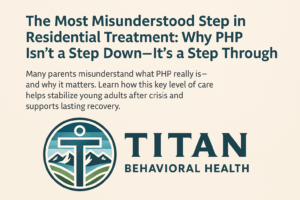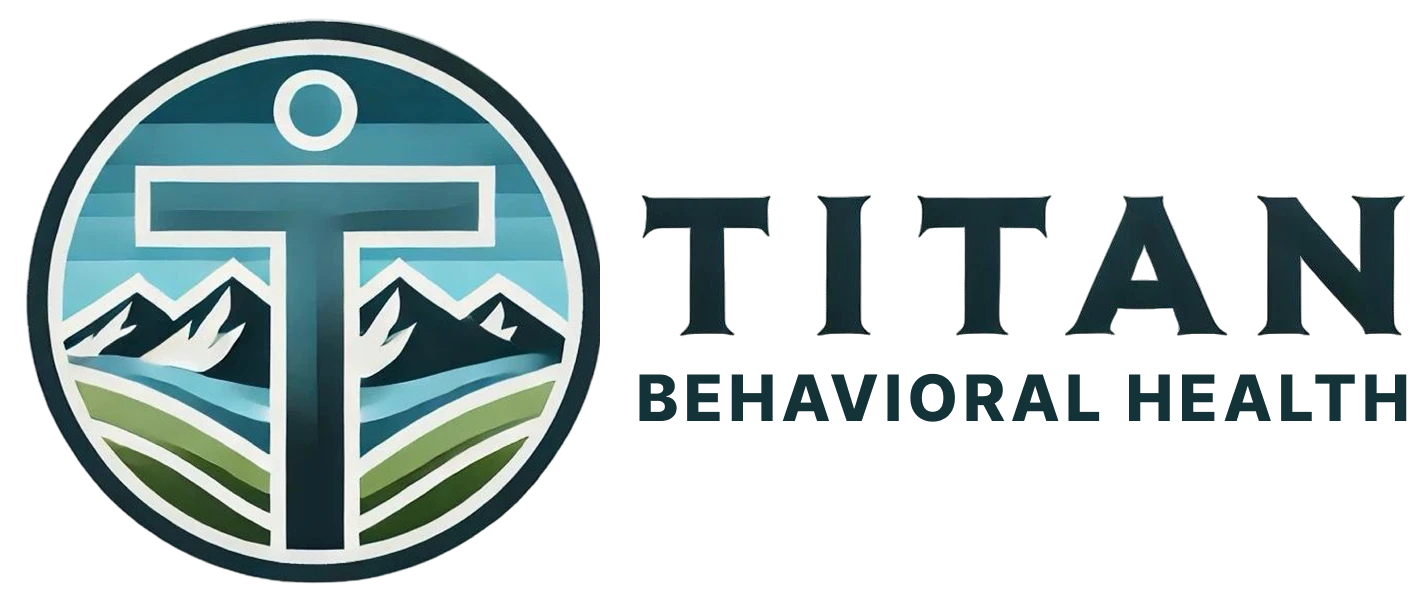You’ve done everything you could. Called the ER. Sat through intake. Waited for updates. Now your child is being discharged—or maybe they’re leaving residential treatment—and someone says the next step is PHP.
And you think: That’s it?
If you’ve never heard of PHP, you’re not alone. Many parents assume it means “done with care.” But in reality, PHP might be the single most important phase of residential treatment treatment. It’s the gear shift that helps young adults go from surviving a crisis to learning how to live again.
What Is PHP? (And Why It Matters So Much)
PHP stands for Partial Hospitalization Program. It’s an intensive, structured form of treatment designed to help individuals stabilize, build coping skills, and continue receiving therapeutic care—without living full-time at a facility.
At Titan Behavioral Health, our PHP in Las Vegas runs five days a week and includes:
- Group therapy and psychoeducation
- One-on-one sessions with licensed therapists
- Psychiatric evaluation and medication support
- Case management and family engagement
- Real-world coping skills and relapse prevention
PHP is not a soft landing. It’s an active treatment phase that gives clinicians a chance to observe what’s working—and what’s still fragile—as your child begins to step into their life again.
Why PHP Often Gets Dismissed (and Why That’s a Mistake)
Many families interpret PHP as a “less serious” option. Here’s why that happens:
- The name sounds misleading. “Partial hospitalization” makes it sound like a brief or watered-down version of real treatment.
- It comes after crisis. Families often feel emotionally exhausted. They want a “finish line”—and PHP doesn’t feel like one.
- It requires trust. You have to let your child go home at night. That can feel terrifying if you’re used to 24/7 supervision.
But here’s what we’ve seen at Titan: when parents misunderstand PHP, they sometimes resist it—or skip it altogether—and their child loses a critical phase of recovery.
PHP is where providers get to test:
Can your child use the skills they learned in residential treatment?
Can they maintain emotional regulation after group?
Do they tell the truth in therapy when they’ve had a bad night at home?
This in-between phase is where healing gets tested and strengthened.
Residential Treatment Treatment Isn’t Just One Setting
Many families think of “residential treatment treatment” as only the round-the-clock kind. But in reality, the phrase encompasses multiple levels of care—including PHP.
Here’s a quick comparison:
| Feature | Residential Treatment | PHP (Partial Hospitalization) |
|---|---|---|
| Environment | 24/7 supervised facility | Daytime care, home evenings |
| Length of Stay | Several weeks to months | Typically 2–4 weeks |
| Focus | Safety, stabilization, diagnosis | Skill-building, real-life integration |
| Family Involvement | Often limited early on | Encouraged and included |
| Support Level | Highest | High (5 days/week) |
| Transition Readiness | Not required | Essential part of discharge plan |
In short: PHP isn’t “less than.” It’s different. It’s a continuation of residential treatment treatment with an emphasis on building stability outside the walls of 24/7 care.
What to Expect from PHP at Titan Behavioral Health
At our Las Vegas facility, PHP is designed to be predictable, structured, and emotionally safe—for both the client and the family. Here’s what a typical PHP day might include:
- Morning check-in with clinical staff
- Group therapy (CBT, DBT, trauma-informed)
- Life skills training and psychoeducation
- Lunch break in a supportive environment
- Individual therapy with a licensed clinician
- Family session (scheduled weekly)
- Medication management if needed
- End-of-day planning and goals check-in
We don’t just monitor symptoms. We explore what happens when structure loosens—how well your child communicates, what coping tools they actually use, and what supports you, the parent, need to stay grounded too.

What If My Child Doesn’t Look Ready?
One of the hardest moments for any parent is realizing your child is still struggling—even as they transition out of inpatient care. It’s easy to panic.
They still have panic attacks. They still isolate. They still say things that scare you.
But that’s exactly what PHP is built for.
It offers daily support without the overprotection of residential. It gives clinicians space to see what happens when your child starts using the skills they’ve learned. And it gives you a chance to be part of the process—without feeling like you’re walking on eggshells or trying to parent in a vacuum.
A Local Option That Keeps Families in the Loop
Choosing a PHP in Las Vegas means you don’t have to ship your child across the country or feel completely cut off from their care. Titan Behavioral Health keeps families involved. We hold space for hard conversations, help you process your own fear and guilt, and support the system your child will be re-entering.
We believe healing isn’t just about the individual—it’s about the family they return to.
When PHP Might Be the Right Call
You might want to explore PHP if:
- Your child is stepping down from inpatient or residential care
- You’re not ready to go from 24/7 care to “normal life” overnight
- Your family is emotionally depleted and needs support
- You want your child to have daily therapeutic contact while staying locally
- You want eyes on the situation that aren’t yours—and aren’t judging
Still unsure? That’s okay. We’ll walk you through it.
FAQ: Understanding PHP
What’s the difference between PHP and IOP?
PHP is more intensive—typically five full days a week. IOP (Intensive Outpatient Program) is less frequent, often 3–4 half-days. PHP is usually the step before IOP, especially after inpatient care.
Does PHP mean my child is “almost better”?
Not necessarily. PHP is not a graduation phase. It’s a critical middle phase where the focus shifts from stabilization to real-world application. Many clients need serious support during PHP—and that’s normal.
Can my child go to school or work during PHP?
Usually not during the program hours. PHP is a full-time commitment, typically 9am–3pm. But it’s designed to prepare your child to return to those responsibilities safely and sustainably.
Will I be involved in my child’s PHP care?
Yes. At Titan, we integrate family therapy and provide parent guidance. Your role matters—and we support you, too.
What if PHP doesn’t feel like enough?
Then we talk. Sometimes PHP needs to be paired with other supports—or revisited later. You’re not locked in. Care can adjust as your child’s needs change.
The Middle Isn’t the End—It’s the Moment That Matters
PHP can feel scary because it marks a shift. But that shift doesn’t mean less care. It means different care. It means walking your child back into life, slowly, carefully, and with clinical support every step of the way.
You don’t have to navigate this alone. And neither do they.
Call (888) 976-8457 or visit to learn more about our residential treatment treatment services in North Las Vegas, NV.

